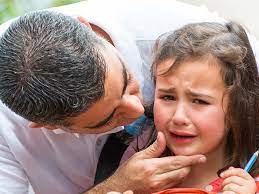Anxiety disorders are the most common mental health disorder in children and adolescents, affecting up to 1 in 5 youths. If your child is struggling with anxiety, you may be wondering about the best way to treat it. There are many different treatment methods available, and the right one for your child will depend on their individual needs. In this blog post, we will discuss 10 of the most common treatment methods for pediatric anxiety.
Contents
Understanding Pediatric Anxiety
 Pediatric anxiety is a common issue that can affect children of all ages. It usually occurs when children feel overwhelmed by stressful situations or life changes. This is a type of mental health disorder that can be caused by a variety of factors, such as genetics, environmental influences, traumatic events, and even lifestyle changes.
Pediatric anxiety is a common issue that can affect children of all ages. It usually occurs when children feel overwhelmed by stressful situations or life changes. This is a type of mental health disorder that can be caused by a variety of factors, such as genetics, environmental influences, traumatic events, and even lifestyle changes.
It is important to identify the signs of pediatric anxiety early so that it can be managed and treated properly. Some common signs to look out for include:
- Excessive worrying
- Fear or panic attacks
- Refusal to participate in activities or social situations
- Physical symptoms such as stomach aches or headaches
- Difficulty concentrating or sleeping
- Avoidance of certain places or people
As you can see the very distressing symptoms of pediatric anxiety can impact a child’s physical, emotional, and mental well-being. Parents often feel helpless as they don’t know how to cope with their child’s anxieties. But it is important that parents recognize the signs and seek professional help if necessary in order to treat the condition.
Top 10 Effective Pediatric Anxiety Treatment Options
Well, treating pediatric anxiety may seem like a daunting challenge. It is important to provide a supportive environment with plenty of encouragement and trust. So that your child can feel secure and safe. Here are 10 effective treatments for pediatric anxiety:
Cognitive Behavioral Therapy (CBT)
This is one of the first-line treatments for pediatric anxiety and is used to help children identify and challenge thoughts that are contributing to their anxious feelings. CBT helps them learn to manage their anxious thoughts and behavior, which can be very effective in decreasing symptoms. There are certain techniques specific to children that can be used to help them learn how to cope with their anxious thoughts.
Exposure Therapy
This type of therapy gradually exposes children to their feared situations and stimuli in a safe and controlled manner. So that they can learn to become desensitized and develop coping strategies. For example, if a child is scared of going to the dentist, they can practice looking at pictures of dentists or even going to the dentist’s office with a parent. In fact, exposure therapy has been shown to be one of the most effective treatments for pediatric anxiety.
Medication
Well, medication in pediatric anxiety treatment should always be a last resort. And must be carefully monitored by a professional. Certain types of medications can help children manage their anxiety symptoms. But they should not be used as a long-term solution. Medication can also have some side effects, so it is important to discuss this option with your child’s doctor. Only then, they can be taken after a thorough evaluation of your child’s health.
Family Therapy
Family therapy is a great way for the family to come together and work out any issues that may be contributing to the child’s anxiety. In this particular type of therapy, the whole family can work together to learn how to better respond and provide emotional support to each other. For example, the family can learn how to provide a more calming environment, which can reduce stress and help the child better manage their anxiety.
Mindfulness-Based Techniques
 These techniques can be used to help your child become more aware of their thoughts and feelings. As well as the environment around them. For example, mindfulness can help them become aware of their physical sensations, such as tightness in the chest or rapid heart rate. This awareness can then be used to better manage anxiety symptoms.
These techniques can be used to help your child become more aware of their thoughts and feelings. As well as the environment around them. For example, mindfulness can help them become aware of their physical sensations, such as tightness in the chest or rapid heart rate. This awareness can then be used to better manage anxiety symptoms.
Relaxation Techniques
Deep breathing exercises, progressive muscle relaxation, and guided imagery are all techniques that can be used to help children relax and manage their anxiety. These techniques can be practiced at home, in school or even when out in public. Because the process is learned, it can be used in any situation to help calm the mind and body.
Art Therapy
This type of therapy involves the use of creative activities, such as drawing and painting. To help children express feelings and emotions related to their anxiety. This can be a helpful way for children to gain some insight into their own thoughts and feelings, which can help them better understand their anxiety and learn how to manage it.
Yoga & Exercise
Exercise can be a great way to reduce stress levels and improve mental health. Try to encourage your child to engage in regular physical activity, such as running, biking, or swimming. Additionally, yoga can be an effective way to help children manage their anxious thoughts and feelings. For instance, when you practice yoga with your child, it can help them slow down and focus on the present moment.
Play Therapy
This type of therapy helps children express their anxiety through play activities, which can help them better understand and manage it. The method of play is usually non-verbal, and this gives children the freedom to express their feelings without having to use words. It can be a great way for children to gain insight into their own thoughts and feelings. As well as learn how to manage them.
Support Groups
Finally, pediatric anxiety treatment included support groups. This is a safe environment for your child to connect with other children who also have anxiety. Here, they can share their experiences and learn from each other. It can be a great way to help your child cope with their anxiety and learn more about the condition. There are different types of support groups to choose from, including online ones. So, it’s important to find the right one that best fits your child’s needs.
These are just some of the many effective pediatric anxiety treatment options. It is important to remember that treatment should be tailored to each individual child’s needs and monitored by a mental health professional. This can help ensure that your child is receiving the best possible treatment for their specific anxiety issues.
With the right support and guidance, your child can learn to better manage their anxiety and live a healthier, happier life.
How Do You Treat Anxiety In Children Naturally?
 It might seem daunting to try and treat anxiety in children without the help of medication, but there are plenty of natural remedies you can use. Here are five tips for helping your child manage their anxiety naturally:
It might seem daunting to try and treat anxiety in children without the help of medication, but there are plenty of natural remedies you can use. Here are five tips for helping your child manage their anxiety naturally:
1. Identify Triggers: One of the first steps to treating anxiety in children naturally is to identify potential triggers. With your child, brainstorm situations or experiences that have brought on feelings of fear or worry in them before. This could include things like a new school, a change in routine, or spending time away from home.
2. Talk it Out: An important part of managing anxiety is understanding it, and having an open dialogue with your child can be incredibly beneficial. Encourage them to talk about their worries or fears in a safe space.
3. Build Coping Skills: Teach your child how to manage anxiety-inducing situations through breathing exercises and positive self-talk. Show them how to identify and name their emotions, and find healthy ways to cope with them.
4. Encourage Healthy Habits: Making sure your child is getting enough sleep, eating nutritious meals, and engaging in physical activity can all help reduce stress levels.
5. Find Support: For many children, talking through their feelings and issues with a therapist can be incredibly helpful. A professional can provide your child with the tools and support they need to better manage their anxiety on their own.
By implementing these tips, you can help your child manage their anxiety naturally, without turning to medications. It may take some time and patience, but it’s possible to reduce anxiety in children without the use of medications.
You can also contact other parents and medical professionals for advice, or look into anxiety support groups in your area. With love, patience, and understanding, you can help your child manage their anxiety naturally.
Conclusion
In conclusion, pediatric anxiety treatment options are numerous and varied. With the help of a knowledgeable mental health professional, families can find treatments that best fit their child’s needs and lifestyles. It is important to keep in mind that there is no one-size-fits-all solution when it comes to treating pediatric anxiety.
So taking the time to explore different options and having open communication with your child’s mental health professional can help ensure that the best approach is taken for your child. With the right support and resources, children can successfully manage their anxiety and lead happy and productive life.
For more information, please contact MantraCare. Anxiety is a feeling of fear, worry, and unease often related to an upcoming event or uncertain outcome. If you have any queries regarding Online Anxiety Counseling experienced therapists at MantraCare can help: Book a trial Anxiety therapy session


